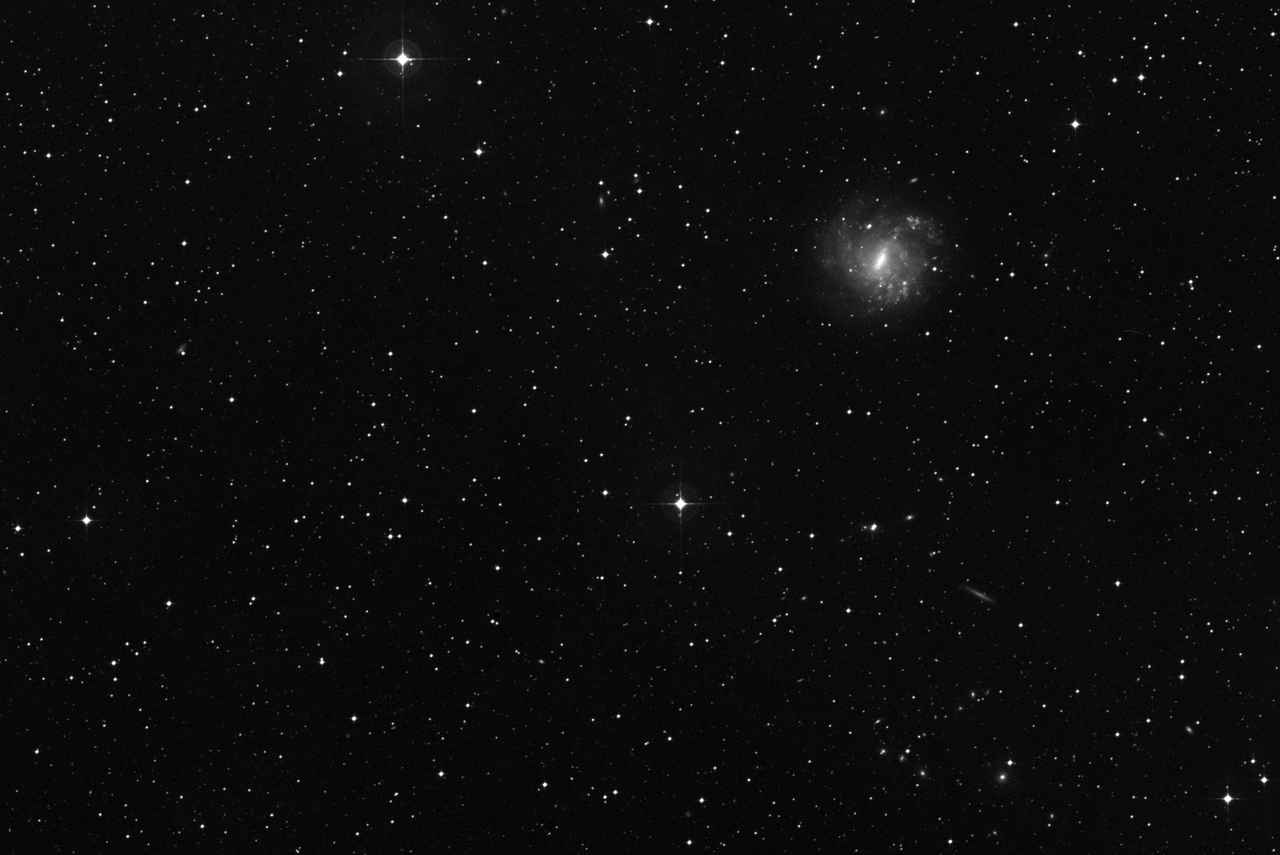Asteroid 324 Bamberga
Asteroid 324 Bamberga is in the constellation of Virgo, at a distance of
Finder Charts
The sky charts below show, at different resolutions, the position of asteroid 324 Bamberga in the sky. Click on each chart to access the interactive star map tool.
The following map uses photographic imagery from the Digitized Sky Survey (DSS) to realistically visualize the precise position of asteroid 324 Bamberga against the stars in the background. The horizontal size of the map measures 60 arcminutes. Click on the image to access a more detailed full-screen view.


Equatorial Coordinates
Apparent
J2000
Additional Information
Rise and Set Times
The following table lists today's rise, transit and set times of asteroid 324 Bamberga from Arcata, Estados Unidos (all times relative to the local timezone America/Los_Angeles):
If you need to access this information frequently for your observations, you can create a simple customized Quick Access page, so that you can easily bookmark it in your browser favorites or add a shortcut to your mobile phones' home screen.
Distance from Earth
The distance of asteroid 324 Bamberga from Earth is currently
The following graph shows the distance of asteroid 324 Bamberga from Earth as a function of time. In the chart the distance is measured in Astronomical Units and the data is sampled with an interval of 1 day.
Note: The values in this chart may not be entirely accurate around the time of closest approach for objects passing very close to Earth at high speed (e.g., Near-Earth Objects).
The value of the distance of 324 Bamberga from Earth is also available as a real time updated value in the live position tracker.
Closest Approach to Earth
In the period between January 1, 1900 and December 31, 2099, the closest approach of asteroid 324 Bamberga to Earth will happen on Wednesday 26 September 2057 at a distance of 0.787268 Astronomical Units, or 117,773,542 kilometers:
Note: the values for the closest approach are computed with a sampling interval of 1 day.
Light Curve
The following chart shows the light curve of asteroid 324 Bamberga, i.e., its apparent magnitude as a function of time. The curve is calculated using the latest ephemerides provided by JPL Horizons. The magnitude data is sampled with the interval of 2 days. Because of this sampling, inaccuracies may occur for objects that have large variations of brightness over a few days. For comets, large discrepancies can arise between the calculated brightness and the observations due to their highly dynamic, and not always precisely predictable, behavior.
Orbital Elements
The following table lists the orbital elements of asteroid 324 Bamberga at epoch February, 24 2023 00:00 UTC (JD: 2460000.5). Source: JPL Small-Body Database
| Element | Symbol | Value |
|---|---|---|
| Orbit eccentricity | e | 0.34129524 |
| Orbit inclination | i | 11.10241930° |
| Perihelion distance | q | 1.76564206 AU 264,136,293 km |
| Aphelion distance | Q |
3.59530924 AU 537,850,609 km |
| Semi-major axis | a |
2.68047565 AU 400,993,451 km |
| Orbital period | period |
4.3886 years 1,602.9362 days |
| Date of perihelion transit | Tp | August 11, 2022 2,459,802.7292 JD |
| Next perihelion transit | December 31, 2026 2,461,405.6654 JD |
|
| Argument of perihelion | peri | 44.137027777497° |
| Longitude of the ascending node | node | 327.85208221042° |
| Mean anomaly | M | 44.416912261272° |
| Mean motion | n | 0.22458786°/day |
Orbit Visualization
The following chart is a 3D animated visualization of the orbit of asteroid 324 Bamberga relative to the other major objects in the Solar System. You can access more advanced features using our 3D Solar System Viewer.
Physical Properties
The table below lists the known key physical properties of asteroid 324 Bamberga. The source for this data is the JPL Small-Body Database.
| Physical Parameter | Value | Relative to Earth |
|---|---|---|
| Diameter | 229.44 km | 0.0180 |
| Sideral Rotation | 29.4300 hours | 1.2296 |
| Absolute Magnitude | 6.82 | |
| Geometric Albedo | 0.0628 |
15 Days Ephemeris
The following table lists the ephemerides of asteroid 324 Bamberga computed for the past and next 7 days, with a 24 hours interval. Apparent celestial coordinates are provided.
| Date | Right AscensionR.A. | DeclinationDec. | MagnitudeMag | Constellation |
|---|---|---|---|---|
| Jul 04 2025 | 13h 18m 37s | -21° 24’ 27” | 13.08 | Virgo |
| Jul 05 2025 | 13h 18m 57s | -21° 23’ 10” | 13.09 | Virgo |
| Jul 06 2025 | 13h 19m 18s | -21° 22’ 00” | 13.10 | Virgo |
| Jul 07 2025 | 13h 19m 40s | -21° 20’ 57” | 13.11 | Virgo |
| Jul 08 2025 | 13h 20m 03s | -21° 19’ 59” | 13.12 | Virgo |
| Jul 09 2025 | 13h 20m 27s | -21° 19’ 10” | 13.13 | Virgo |
| Jul 10 2025 | 13h 20m 53s | -21° 18’ 27” | 13.14 | Virgo |
| Jul 11 2025 | 13h 21m 20s | -21° 17’ 50” | 13.15 | Virgo |
| Jul 12 2025 | 13h 21m 47s | -21° 17’ 20” | 13.16 | Virgo |
| Jul 13 2025 | 13h 22m 16s | -21° 16’ 57” | 13.16 | Virgo |
| Jul 14 2025 | 13h 22m 45s | -21° 16’ 40” | 13.17 | Virgo |
| Jul 15 2025 | 13h 23m 15s | -21° 16’ 30” | 13.18 | Virgo |
| Jul 16 2025 | 13h 23m 46s | -21° 16’ 26” | 13.19 | Virgo |
| Jul 17 2025 | 13h 24m 19s | -21° 16’ 29” | 13.20 | Virgo |
Additional Resources on TheSkyLive
- Asteroid 324 Bamberga: Complete reference information on TheSkyLive.com.
- Where is asteroid 324 Bamberga?: Key information on where to find asteroid 324 Bamberga in the sky.
- Distance of asteroid 324 Bamberga from Earth: Find out how far asteroid 324 Bamberga is from Earth right now.
- How Bright is asteroid 324 Bamberga?: Current visual brightness (magnitude) and apparent size.
- Rise and Set Times: Rise and set times of asteroid 324 Bamberga from your location.
- Interactive Sky Map: Planetarium-style interactive visualization of asteroid 324 Bamberga's position in the sky.
- Live Position Tracker: High precision real time tracker of asteroid 324 Bamberga's position using deep space imagery.
- Ephemeris: 15 days asteroid 324 Bamberga's computed ephemeris.
- Orbital elements: Information about asteroid 324 Bamberga orbital parameters.
- Orbit Visualization: 3D interactive visualization showing the orbit of asteroid 324 Bamberga with respect to the major Solar System objects.
- Physical Data: Detailed information about physical properties of asteroid 324 Bamberga.











